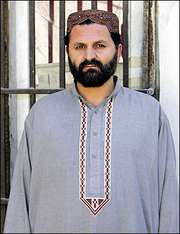An internal debate within the Taliban - whether to launch increasingly aggressive attacks against the US-led coalition or to allow the insurgency to bleed the Afghan government over time - has been settled this year, according to a rebel commander and Afghan security officials.
In the most violent year of their insurgency to date, the Taliban have gone on the offensive, launching more pitched battles in an effort to persuade the international community and Afghans that this remains very much a nation at war, says Mullah Gul Mohammad, a front-line commander for Jaish-e Muslimeen, a recently reconciled Taliban splinter group.
"For the past many days we [the Taliban and the Jaish] have been fighting together against our common enemies," says Mullah Mohammad, who says he traveled from Afghanistan to Chaman, Pakistan, for an interview. The insurgents are flush with new weapons - including surface-to-air missiles - and cash, he says, and are pausing only to see if the US military decides to draw down forces following the Sept. 18 parliamentary elections. "If they stay, we would launch our attacks anew."
In the four years since the fall of the Taliban government, there have been many moments when it appeared that the Taliban insurgency had breathed its last breath. But this year was different. The Taliban have launched a series of attacks that has raised this year's death toll - 1,200 civilians and military personnel so far - to a wartime high. Their attacks show increasing sophistication, US and Afghan officials say, and a UN report now warns that the Taliban may be receiving tactical training from jihadists returning from Iraq.
With an apparently revitalized Taliban insurgency, the American military and its NATO allies must now decide whether their strategy needs retooling, and American diplomats could have increasing difficulty convincing NATO allies to take over leadership of the Afghan counterinsurgency campaign. It could be a hard sell, indeed. Even US military commanders say it is too soon to count the Taliban out.
"I'm not ready to sign up to the fact that Taliban are crumbling," said Gen. Jason Kamiya, operational commander for the US-led Combined Forces Command, at a recent press conference at Bagram Airbase. "There still will be an enemy insurgency next spring."
At first glance, the Taliban appear to be a weak force. US military estimates suggest there may be only 800 Taliban fighters left, many of them holding out in villages along the Afghan-Pakistan border, and in rugged mountainous regions of south and central Afghanistan. One clear sign of Taliban weakness was seen on election day, where no significant incidents of violence disrupted voting, despite a call for a boycott by Taliban spokesman Abdul Latif Hakimi.
Yet, US and Afghan intelligence sources suggest that the Taliban have shown recent signs of confidence - or desperation. Roadside bombings have increased 40 percent this year over last year, according to a report by the UN. These bombings have become increasingly effective, using "shaped" explosives used by Iraqi militants against US forces there, set off by sophisticated remote-control devices.
Perhaps more important, the Taliban are sticking around to fight US forces after they detonate roadside bombs, using heavy machine guns, rocket-propelled grenades, and Kalashnikovs to pin down US troops and increase casualties.
When they are captured, the Taliban often carry high-tech radio equipment, and are even wearing new sneakers, all signs that the insurgents have found new financial support.
"They are updating their technology," says Gov. Mirajuddin Pathan, governor of Khost Province, which shares a 110-mile border with Pakistan's tumultuous Waziristan district. "They have new remote-control devices, new explosives. They never stay quiet. But now, we have better intelligence of what they are planning."
Just last week, national intelligence police swept through the dormitories of Khost University and arrested eight people. The leader appears to have been a third-year engineering student from Afghanistan's central Wardak Province. He and the other suspects were captured with 200 pounds of explosives and two sophisticated remote-control systems.
The simplest of the two was designed to set off one land mine in an urban area to attract a crowd. Once a sufficient crowd had gathered, and police officers had arrived to investigate, a second larger explosion would detonate, inflicting a heavy death toll.
"This has become rather ordinary technique," says a senior officer for the National Directorate of Security, Afghanistan's intelligence agency, based in Khost.
He picks up a black box of circuit boards, wires, and a battery. "The technique is very old, it belongs to Gulbuddin Hekmatyar," he says, referring to the commander of Hizb-e Islami, a radical Islamist party that fought against the Soviets. "The technology is new, from Japan and China. The training is Al Qaeda."
Pakistan, which many Afghan officials believe is continuing to support the Taliban movement, says that it has killed 353 militants in its border tribal areas since March 2004. Some 175 of these militants have been foreigners such as Uzbeks, Tajiks, Turkmens, Chechens, and a few Arabs.
This month, Pakistani authorities also announced a major haul of explosives and weaponry after an early September raid of a madrassah near the Waziristan town of Miranshah. The madrassah, run by a relative of Taliban commander Jalaluddin Haqqani, had become a storage depot for weapons. Twenty-one suspects, 11 of them foreigners, were arrested.
Among the items found at the madrassah was a small battery-operated remote-control plane with a wide-angle camera lens, apparently used to track US military troop movements inside Afghanistan.
US military commanders admit that 2005 has been the bloodiest year yet in the Afghan campaign - with 82 US military fatalities this year. But they insist that the higher death toll comes from a more aggressive US strategy to take the war to the enemy.
Taliban commanders and their allies say that it is their own strategy that has changed, and they boast that they now have the finances, equipment, and motivation to fight on for years, or even decades.
"Both the Taliban and Jaish have weapons and arsenal which were being piled up in the past several decades; we have enough for centuries to come," says Gul Mohammad, one of a few top commanders for Jaish-e Muslimeen. He is on Pakistan's most wanted list.
Mohammad says the Jaish, with help from Hizb-e Islami, have recently uncovered a large cache of old weapons, including American shoulder-fired rockets that are capable of shooting down US military planes and helicopters.
In 2002, US forces found an old cache of 30 such rockets as part of a wider effort to collect any US-made Stinger missiles leftover from the anti-Soviet jihad. Over 2,000 Stingers were sent to Afghanistan via Pakistan in the 1980s, and the weapons proved extremely effective against Soviet airpower. As of early this year, no US aircraft has been shot down by a Stinger.
"We have found a new depot of weapons in Afghanistan and we can now strike down American aircraft and helicopters," Gul Mohammad declared enthusiastically. A US Chinook helicopter crashed Sunday in southern Afghanistan, killing all five crew members. The Taliban claim to have shot it down, but the US military said that did not appear to be the case. The crash remains under investigation.
Aside from weapons, Gul Mohammad says the broader insurgent movement is now adequately funded through zakat, the traditional tithe that Muslims pay to their mosques as charity for the poor and disadvantaged.
Khost officials such as Governor Pathan say that the peaceful elections are a sign that the Taliban are disorganized, weak, and on the run. It is certainly true that the Taliban have had an ongoing debate about how aggressively they should fight against the US, whose airpower killed hundreds if not thousands of Taliban fighters with high-flying B-52 bombers in October 2001.
But while the Jaish recently broke with the Taliban in Oct. 2004 - with its brazen kidnapping of three UN election workers in the middle of a Kabul traffic jam - Gul Mohammad says that these differences have been settled for now.
"Our differences were based on some principles, but even those were just for a temporary phase," Gul Mohammad says. "We are fighting a common enemy." |
 Peshawar, 2 March (AKI/DAWN) - Pakistani security forces have captured Mullah Obaidullah Akhund, deputy to the elusive Taliban chief, Mullah Mohammad Omar, from Quetta, a federal government official told Dawn. Mullah Obaidullah, former Taliban defence minister, was arrested on Monday, the official said, requesting anonymity due to the sensitivity of the information. The Taliban leader carries a 1 million dollar reward and is the most senior Taliban figure captured since the ouster of the puritanical militia from power in November 2001.
Peshawar, 2 March (AKI/DAWN) - Pakistani security forces have captured Mullah Obaidullah Akhund, deputy to the elusive Taliban chief, Mullah Mohammad Omar, from Quetta, a federal government official told Dawn. Mullah Obaidullah, former Taliban defence minister, was arrested on Monday, the official said, requesting anonymity due to the sensitivity of the information. The Taliban leader carries a 1 million dollar reward and is the most senior Taliban figure captured since the ouster of the puritanical militia from power in November 2001.

 Pakistan has extradited 14 Taliban fugitives to Afghanistan, the first such move by Islamabad since U.S-led forces overthrew the radical Islamist government in 2001, officials said on Thursday. Taliban spokesmen
Pakistan has extradited 14 Taliban fugitives to Afghanistan, the first such move by Islamabad since U.S-led forces overthrew the radical Islamist government in 2001, officials said on Thursday. Taliban spokesmen  KABUL - Fourteen Taleban prisoners were extradited from Pakistan to Afghanistan on Wednesday, including two leaders of the hardline militia removed from government four years ago, the presidentâs office said. The prisoners also included the ousted militiaâs one-time spokesman,
KABUL - Fourteen Taleban prisoners were extradited from Pakistan to Afghanistan on Wednesday, including two leaders of the hardline militia removed from government four years ago, the presidentâs office said. The prisoners also included the ousted militiaâs one-time spokesman, 
 KANDAHAR, Afghanistan - Ten insurgents and an Afghan soldier were killed in an operation to arrest a top Taleban commander in southern Afghanistan, a governor and the US military said on Friday. Coalition and Afghan troops came under attack by up to 20 âenemy firing small arms, heavy machine guns, mortar rounds and rocket-propelled grenades,â the US military said in a statement. âCoalition and US close air support and US attack helicopters arrived at the scene, blasting enemy positions killing 10 enemy combatants,â it said.
KANDAHAR, Afghanistan - Ten insurgents and an Afghan soldier were killed in an operation to arrest a top Taleban commander in southern Afghanistan, a governor and the US military said on Friday. Coalition and Afghan troops came under attack by up to 20 âenemy firing small arms, heavy machine guns, mortar rounds and rocket-propelled grenades,â the US military said in a statement. âCoalition and US close air support and US attack helicopters arrived at the scene, blasting enemy positions killing 10 enemy combatants,â it said.